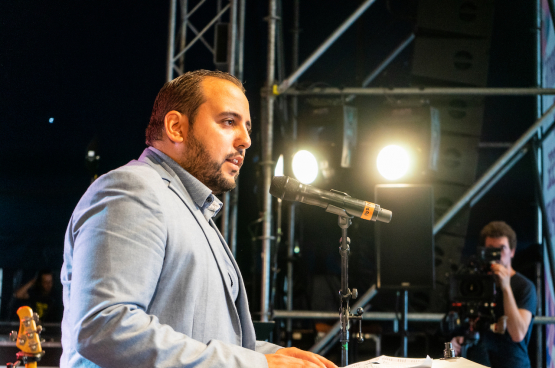Interview with Hillal Sor, the metalworkers’ trade union Secretary General.
Interview with Hillal Sor, the metalworkers’ trade union Secretary General.
From Brussels / Belgium
We are continuing our interview made in Brussels, Belgium, with European representatives and their views on NATO and militarization. Today, we asked Hillal Sor for his opinions. Sor is Secretary General of the metalworkers’ Trade Union within the General Labour Federation of Belgium. His trade union has 130,000 members and is the leading representation in the sector.
So how is the working class in your sector affected by policies of militarization?
The people in my sector are touched because all the budgets of our country is now directed to the arms and all other politics like progressive politics are cancelled. Like retirement, social, public lodgment, everything is now crouched, so all the budget is now directly put into the arms. So, people are directly confronted to that situation.
And how are the labor rights in that sector that you are working in?
Yes, now there is now a project in the EU to put down the legislation in the defense sector, arms sector, to produce more. And so they want to decrease the condition of work to produce more arms. So we are conflating to that project in Europe.

And how is your work as a trade union against these policies of militarization and their effects on labor?
First is to put conscience into the people, because all the media in Europe are putting the pressure to increase budget, to say we are now facing Russia, we’re facing China, Iran. And so, the mediatic pressure is very high.
So, we have to discuss with people in the companies, to discuss with people, to inform in the companies. This is the first thing that we do, and to take public position regarding our organization, and participating in that type of meeting, and participation in mobilization.
There were also some activities like actions taken by trade unions here in Belgium, concrete actions. Can you describe us a little what happened there?
Yes, especially in the transport sector, some organization, trade union, had a position to not transport arms to Israel, to say ‘we don’t want to transport arms to Israel, we don’t want Israeli companies to fly companies to be here in Brussels’. So the trade union in some sectors have taken a position very clearly.
And how was this received by the workers, by the rest?
That position was constructed with workers, not the trade union top down, but down top. People said we don’t want to do that, and the trade union was the messenger for that position.
So, it came from the workers themselves?
Yes, yes.
Okay, and how was it received by the public then?
I think the public in Belgium received that well because now with the genocide in Gaza there is a lot of demonstration here in Belgium.
Most of the people, 70% of the people in Belgium want sanction to Israel, most people in Belgium received that well.
Do you think that the trade union’s or the labor movement’s fight against militarization will radicalize in the future more, involving maybe kind of strikes regarding these budget problems or labor rights?
I think with the time, more and more people will be conscious of that situation. Because now the 5% are an idea, but not concrete. Then people see what it’s going to be with 5% of the GDP in arms, it’s less social security, less money for the people, less budget for the social policies. When the people will see that, I think that the radicalization of the movement against that policy will be higher, but if the trade union take that movement in charge, we can have mass mobilization.
If the trade union are silent about that, the strategy and the mass mobilization will be more and more difficult for the people. So we have to take that in our position and mobilization for the people. So, we have to take that in our position and mobilization for the people.
Thank you very much.

















Leave a Reply